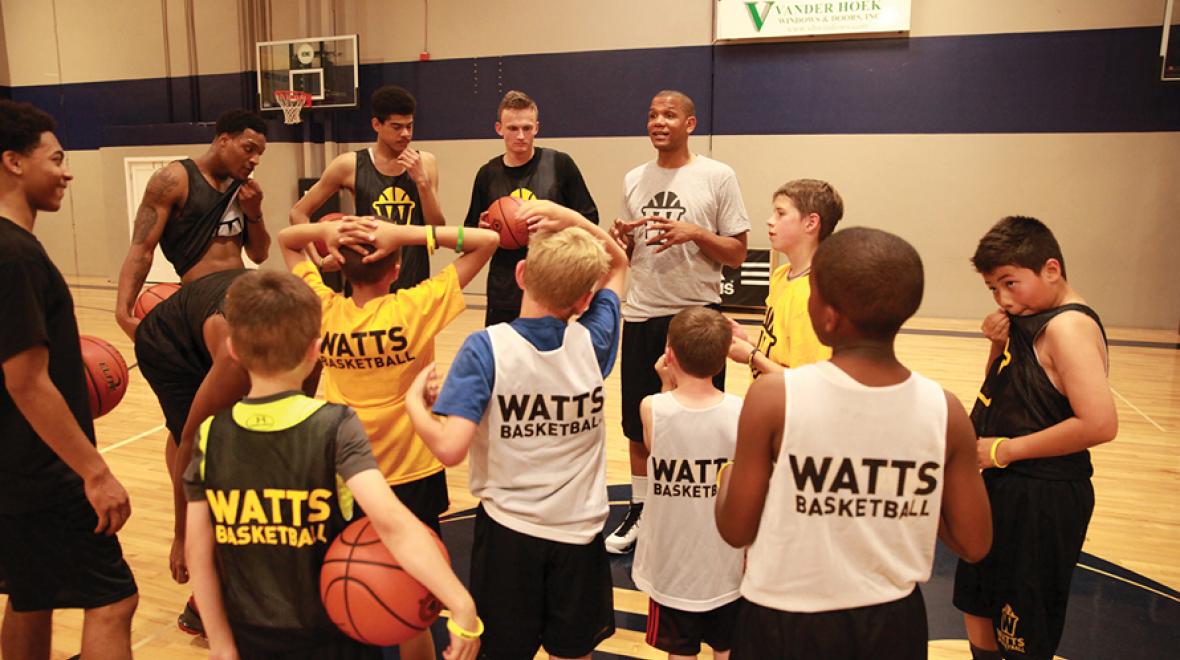
As a star 3-point shooter who led the University of Washington Huskies to two NCAA tournaments in the late ’90s, Donald Watts knows a thing or two about intense athletic competition and the importance of strong technical skills. But it’s the skills that translate off the court — such as teamwork, cooperation and self-awareness — that matter most for youth athletes, he says.
This year, fewer kids will reap the rewards of athletics. A Sports & Fitness Industry Association report shows that youth sports participation is down 8 percent compared to 10 years ago, when nearly half of kids participated in sports. This trend is about more than kids building physical skills, says Watts, son of Seattle SuperSonics player Slick Watts and owner of Watts Basketball, an organization offering youth camps, classes and coaching. According to Watts, declining sports participation means that more kids will miss out on developing important social and emotional skills, such as behavioral regulation and handling feedback from others.
Now the parent of two teen athletes, Watts views sports play as an opportunity for kids to build important skills they might not get elsewhere. Keeping more kids in the game may mean updating our views on coaching, competition and athletic skill. He notes: “Sports are a reflection of where we are as a society, and they can help move us forward.” Here, Watts weighs in on how families can get kids back on the court, field or turf.
As a coach, what’s the biggest shift in the culture of youth sports that you’ve noticed in recent years?
Sports have become hypercompetitive and more adult-centered. As elite programs have come in and taken over, you see younger kids competing and trying to win championships — really, to win them for adults. While there is a time and a place for that kind of competition, it comes after the kids have had the chance to discover the joy of the game and what they want to do.
How can sports help kids build life skills like communication, cooperation and self-advocacy?
We know that social media isn’t teaching our kids real social skills. But what kids are getting online is immediate feedback. Sports offer kids that kind of immediate feedback about performance from coaches and peers, which helps them develop a healthy self-awareness about their performance. They get to learn how to change their performance and how those changes impact others around them. Built into that is conflict resolution, doing things for the greater good and connecting to a peer group in a real way.
How can parents find sports programs that emphasize lifelong skill building and community values over competition?
Parents should know they’re in control; they get to decide what to invest in for their kids. And when you invest in something, you do research. Go have a trial session or observe a class or practice, and see how the coach treats the team. Think about what you and your child want out of the experience; if you’re looking to try something new or help burn off some energy, don’t choose an elite competitive team. Keep your own family values in mind and make sure the team’s values are in line with them. With my children, I want to know that a coach is going to teach them, not scream at them. I want to know that a coach has a vision for them and supports each player.
The Sports & Fitness Industry Association report shows that children from households earning less than $100K are less likely to participate in team sports. What’s behind the economic divide?
As sports get more competitive and expensive at younger ages, families have to make choices about how they’re going to invest their resources. Creating better sports partnerships with schools and community programs helps make sports available to kids at a younger age. Foundations and nonprofits can help families in a position of need; the Watts Foundation offers scholarships, and we need community support to be able to do that.
We also need to keep youth sports in the proper perspective, as far as winning and losing, and that’s hard when families are spending so much money on sports in grade school. For young kids, we shouldn’t worry so much about how many points they’re scoring. We’ve seen that if we invest in certain skill sets and develop those over time, those kids can go on to have great high school careers. And that means we’re not so concerned about winning a championship in sixth grade.
Beyond Tolerance
In 2019, ParentMap is dedicating consistent thoughtful coverage to cultivating tolerance. We will rally partners and experts to help us deliver practical and powerful tools, perspectives and tips to parents and educators for teaching empathy, equity, acceptance, respect and inclusion to our children.











